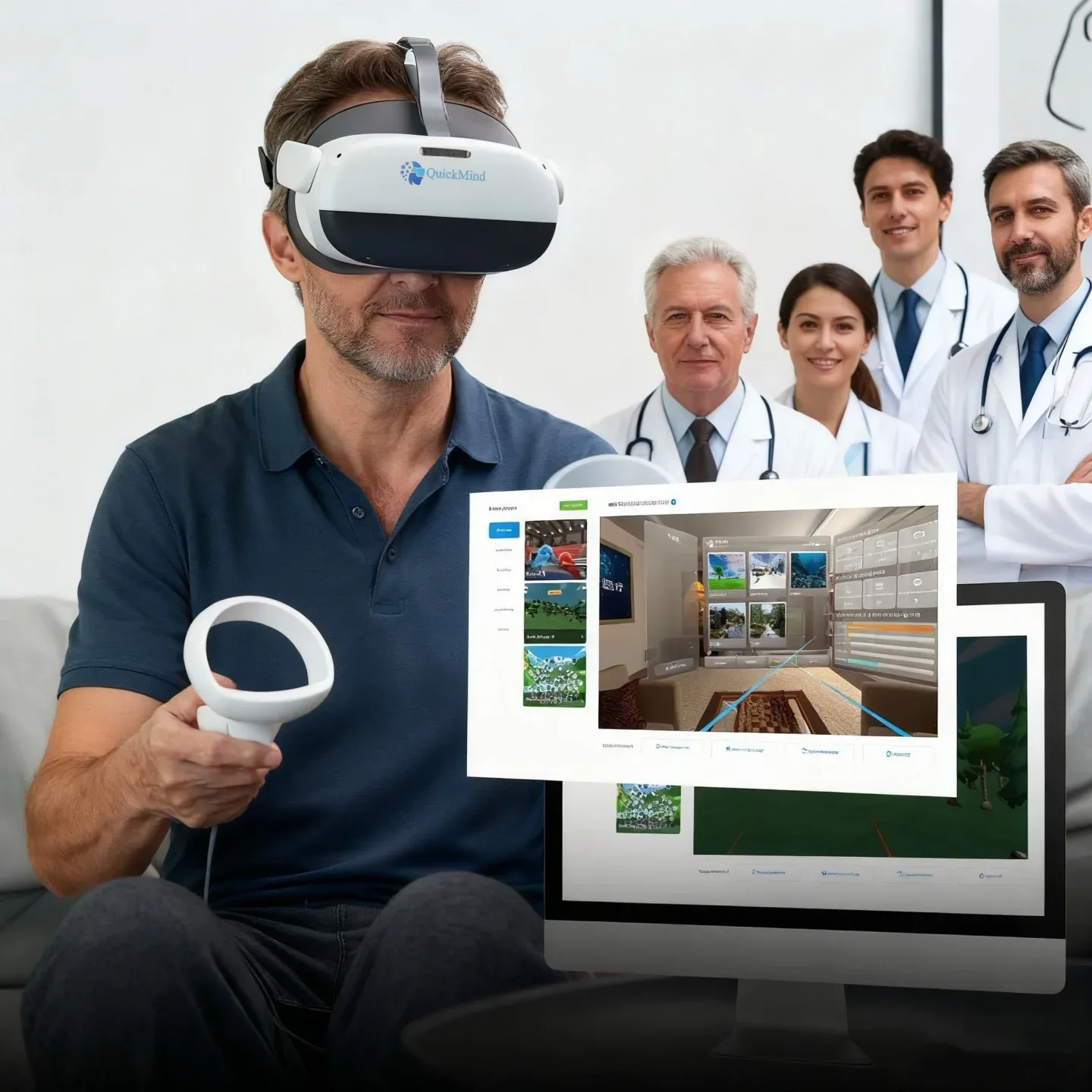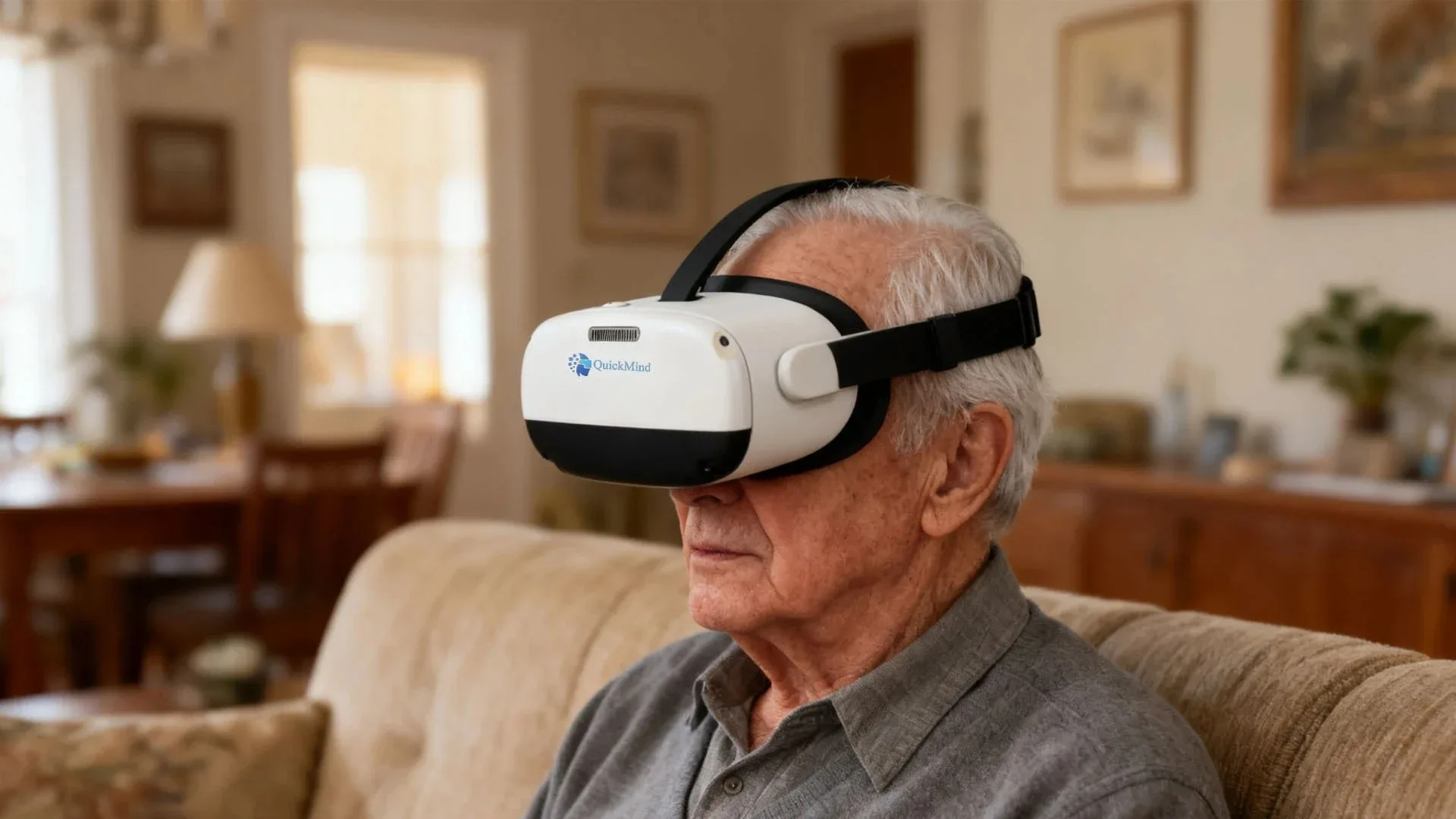
Expanding examinations shows that interactive virtual spaces modality can profoundly enhance the quality of people living with age-related cognitive diseases. By shifting them to comforting locations, VR presents a exceptional pathway for intellectual provocation, feelings management, and collective involvement. Numerous analyses have reported that VR therapy can decrease distress, unease, and despair in dementia subjects while also refining their remembrance, awareness, and verbal abilities.
- VR allows persons with dementia to revisit beloved recollections through hands-on emulations.
- Furthermore, it can provide a safe and supportive space for group interaction, promoting a perception of bond and inclusion.
- Researchers maintain that VR therapy has the likelihood to overhaul dementia assistance by delivering new and novel ways to combat the multifaceted problems faced by persons suffering from this malady.
Electronic Health Solutions for Mental Boosting in Alzheimer's
Growing virtual strategies are exhibiting benefits in the field of mind sharpening for people dealing with Alzheimer's ailment. These technologies harness automated tools to boost brain capability and hypothetically reduce the growth of the affliction. Gamified tasks, personalized feedback, and mental training are some examples of methods being researched in this flourishing field. While investigations are advancing, digital therapeutics deliver a auxiliary course for augmenting the well-being of those managing neurodegenerative Alzheimer type.Digital Terrain Exploration in Alzheimer's Disease Management
Pertaining to subjects battling Alzheimer health issue, the incremental deterioration of remembrance and brain functions can drastically impair their capability to interact with the immediate surroundings. This damaging affliction often elicits in loneliness, confusion, and a decreased self-perception. Up-to-date advancements in virtual reality technology bring a trailblazing means to counteract these concerns by constructing immersive landscapes that can ignite the brain and invigorate cognitive function.
Digital immersive sceneries engineered specifically for Alzheimer's sufferers can convey them in beloved places, such as their first house or a beloved garden, recalling positive memories and mitigating anxiety. Through interactive activities, these virtual domains can also stimulate cognitive abilities like recollection, mindfulness, and problem-solving.
The positive effects of virtual reality in Alzheimer's remediation are extensive. Early evaluations have established optimistic results, with participants demonstrating improvements in cognitive skills, mood, and overall quality of life. As this technique evolves, it holds the key to altering the way we approach Alzheimer's disease, presenting a new pathway for management and empowerment.
Digital Memory Therapy for Alzheimer's Disease
Reminiscence therapy is a popular technique used to augment cognitive function and mental health in individuals with Alzheimer's disease. This established form of therapy involves stimulating patients to share past experiences, often through interchange. However, a groundbreaking approach is emerging: VR-mediated reminiscence therapy.
This immersive technique utilizes virtual reality headsets to bring patients in authentic environments that evoke memories from their past. By going through these computer-generated environments, individuals with Alzheimer's can engage with their past in a expressive way.
Harnessing VR to Improve Cognitive Abilities in Dementia
Virtual reality (VR) is emerging as a hopeful technology in the fight against dementia, offering advanced ways to stimulate memory and cognition. By forming immersive worlds, VR can help individuals with dementia reexperience memories, engage in meaningful activities, and augment cognitive faculties. Studies have established that VR interventions can lead to noticeable improvements in memory recall, attention, and positional awareness. Moreover, VR provides a harmless and inviting space for individuals with dementia to demonstrate, reducing feelings of isolation and unease.
- Furthermore, VR can be tailored to individual needs and preferences, enabling greater levels of participation.
- Considering the potential of VR, further research is needed to fully understand its long-term efficacy in dementia care.
Rekindling Memories, Rebuilding Connections: VR's Impact on Social Engagement in Alzheimer's Disease
Artificial augmented spaces is emerging as a cutting-edge device in the area of dementia care. By creating interactive and collaborative settings, VR has the prospect to encourage memories, strengthen social interaction, and raise the overall quality of life for patients affected by Alzheimer's. Notably a key remarkable aspects of VR is its ability to take users to recognizable places and occasions from their past. Whether it's a tour of a childhood home or a recreation of a beloved holiday, these virtual travels can trigger happy memories and improve cognitive abilities. Furthermore, VR can promote social interaction by connecting individuals with others who share similar hobbies. This can be particularly beneficial for people with Alzheimer's who may face difficulties with traditional social communication. By creating a safe and interactive virtual space, VR can lessen feelings of isolation and loneliness, which are common among patients experiencing Alzheimer's. Overall, VR holds immense potential for revolutionizing the lives of dementia patients with Alzheimer's by revitalizing memories, recovering connections, and enhancing their quality of life. As technology continues to advance, we can expect even more advanced applications of VR in the field of dementia care.Leveraging Cognitive Training: Employing VR Tools for Alzheimer's Care
Immersive reality systems is rapidly emerging as a game-changing tool in the realm of cognitive training, particularly for patients experiencing Alzheimer's disease. By immersing patients in interactive and engaging virtual environments, VR-based interventions can stimulate cognitive functions such as memory, attention, and problem-solving. These games typically incorporate elements of storytelling, exploration, and social interaction, making the training process exceptionally satisfying. Studies have shown that VR-based cognitive training can lead to substantial improvements in cognitive performance, maybe delaying the progression of Alzheimer's symptoms. Moreover, VR provides a safe and controlled environment for patients to practice new skills and build their confidence.
- Game-enhanced procedures in VR training can make it more interactive and appealing for individuals with cognitive impairments.
- VR simulations can offer accurate scenarios that encourage and raise cognitive functions.
- Personalized VR experiences can cater to distinct expectations and habits.
Harnessing Virtual Settings for Dementia Relief
Immersive computer-generated settings offer a breakthrough and hopeful avenue for participants with mental deterioration. These technologies can simulate familiar environments, allowing those affected by cognitive decline to recollect cherished memories and develop a sense of comfort. By mitigating the effects of dementia, VR realities have the promise to advance quality of life for both individuals and their caregivers.
- Studies indicate that VR methods can effectively impact cognitive function, affective well-being, and even movement abilities in individuals with dementia.
- Moreover, VR affords a safe and supportive environment for interaction, reducing the risk of anxiety.
- Additionally, VR can promote social interactions by allowing individuals with dementia to collaborate in computer-generated activities with others.
Leveraging VR for Timely Alzheimer's Diagnosis and Care
Alzheimer disorder presents a sophisticated difficulty, often being undiagnosed in its early stages. Albeit, virtual reality (VR) is developing as a groundbreaking tool for early discovery. Through immersive scenarios, VR can analyze cognitive capacity in ways that traditional methods fail to. This possibility allows for early treatment strategies, potentially reducing disease progression and enhancing the quality of life for people with Alzheimer's.
- VR cognitive tests measure recall, alertness, and positional skills in safe and regulated spaces.
- Individualized VR environments encourage client participation in brain-boosting activities.
- Digital virtual settings create opportunities for people with Alzheimer's to link and participate.
Connecting Dementia Patients: VR's Role in Communication and Interaction Enhancement
{In the realm of dementia care, innovative technologies are emerging to upgrade the lives of people affected by dementia. Virtual reality (VR) is one such innovation that holds immense opportunity for bridging the communication and interaction gap often experienced by those with dementia. By developing compelling digital realities, VR can engage cognitive function, reduce behavioral issues, and ultimately improve the overall well-being of dementia patients.
VR experiences adapted to dementia patient needs can range from recall therapy sessions that transport participants to cherished memories, to interactive games that promote social interaction and cognitive training. Furthermore, VR has the aptitude to connect participants in dementia care with associates, regardless of physical barriers, fostering a sense of belonging.
- VR can facilitate in reducing agitation and anxiety by providing a calming and distracting environment.
- Evaluations have shown that VR interventions can lead to improvements in cognitive function, mood, and social interaction in clients experiencing cognitive decline.
- As technology evolves in advance, we can expect even more innovative and {effective|beneficial|helpful|powerful|impactful|successful|productive|efficient
